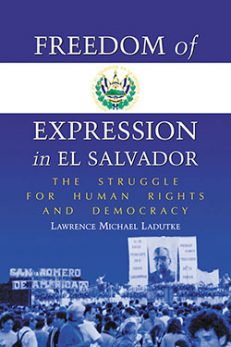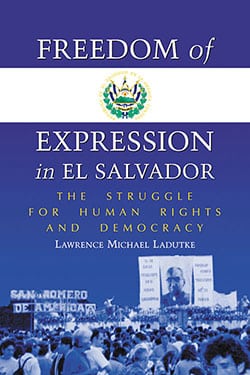Subtotal: $31.99
Freedom of Expression in El Salvador
The Struggle for Human Rights and Democracy
Original price was: $45.00.$31.99Current price is: $31.99.
In stock
About the Book
Both academics and diplomats frequently cite postwar El Salvador as an example of successful conflict resolution and democratization. Salvadoran human rights advocates, however, have had to continually and publicly express their support of key provisions in the 1992 peace accords. This freedom of expression contributed to the punishment of those responsible for the murder of opposition leader Francisco Velis and medical student Adriano Vilanova. Human rights advocates have been less successful in other areas, however, including their opposition to amnesty laws for wartime human rights violators and their work against vigilante death squads.
This study covers the 1992 peace accords, which include the removal of human rights abusers from the military, the creation of a truth commission and the demilitarization of public security. It also discusses the troubling indications that the government is once again reducing the space available for freedom of expression, including the undermining of the Office of the Human Rights Counsel, the hostile attitude of President Francisco Flores, evidence of internal espionage and a changing international context. Later chapters focus on police reform. The book concludes by presenting some suggestions for increasing freedom of expression in transitional societies such as El Salvador. There is much evidence that shows human rights are likely to be a better protected right when citizens and civil society institutions routinely exercise their right to freedom of expression.
About the Author(s)
Bibliographic Details
Lawrence Michael Ladutke
Format: softcover (6 x 9)
Pages: 273
Bibliographic Info: appendices, notes, bibliography, index
Copyright Date: 2004
pISBN: 978-0-7864-1825-1
eISBN: 978-0-7864-8108-8
Imprint: McFarland
Table of Contents
Acknowledgments vii
Preface 1
1. Introduction 5
2. Powerful Obstacles to Expression in Salvadoran History 18
3. Impunity Continues to Constrain Freedom of Expression 49
4. The Dominant Media Continue to Hinder Freedom of Expression 68
5. Dealing with Wartime Human Rights Abuses 88
6. The Demilitarization and Remilitarization of Public Security 126
7. Death Squads Seek to Destabilize the Transition 153
8. The Unusually Successful Prosecution of Police Agents in the Vilanova Murder 182
9. Expression for and against the Vigilante Death Squad Sombra Negra 204
10. Conclusion 218
Appendix I: Acronyms and Abbreviations 233
Appendix II: Salvadoran Newspapers Consulte 236
Notes 237
References 243
Index 257
Book Reviews & Awards
“a readable, well-argued book…recommended”—Choice; “a strong corrective to scholars…who have been too sanguine about El Salvador’s post-war democracy…drives home how contingent, fragile, and contested El Salvador’s post-war democracy remains”—Journal of Third World Studies.

 Freedom of Expression in El Salvador
Freedom of Expression in El Salvador 



